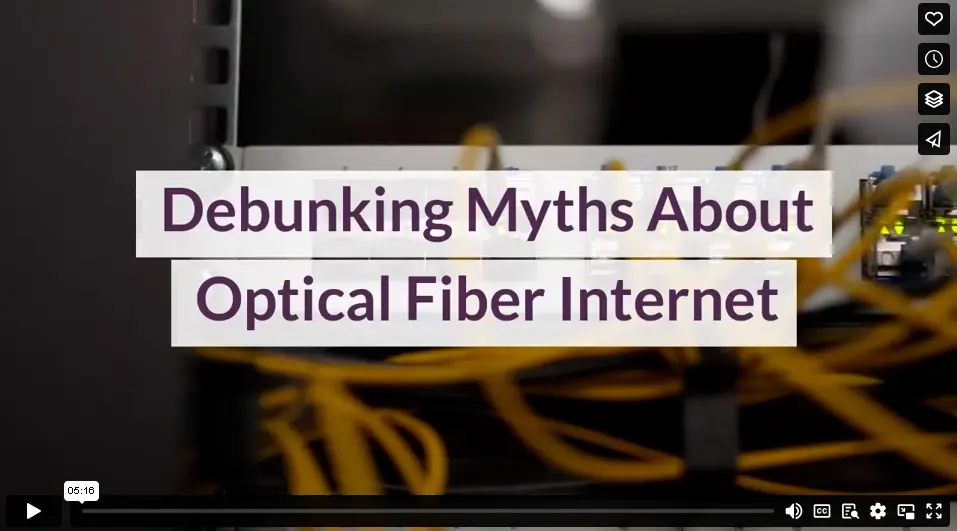Is optical fiber internet really worth it? Some say it’s too expensive, with no clear ROI. Others insist it’s the future of connectivity and the key to improving operational efficiency and scalability.
The market for fiber optics has exploded in recent years, yet many businesses are still hesitant to make the switch. If you’re one of them, let’s separate fact from fiction and help you make an informed decision.
Myth: Fiber Optic Cables Might Cause Fires
Reality: Fiber optic cables don’t carry any electricity. Instead, fiber optics use light to transmit data, which means the risk of fire is practically zero. The absence of electrical current also means they won’t interfere with your other equipment.
Myth: Fiber Optic Cables Are Too Fragile
Reality: You might think fiber optic cables are breakable because they’re made of glass. But they’re tougher than they look. The glass fibers are thinner than a hair. When bundled together, they make a cable that can handle just about anything. Rain, snow, heat—fiber can take it. And it’s actually more durable than old-school copper.
Myth: Fiber Optic Internet Is Only for Big Companies
Reality: Do you think fiber optic internet is only for large enterprises with deep pockets? But that’s not the case. Fiber is becoming more accessible, and businesses of all sizes are making the switch. Whether you’re running a small office or a growing startup, fiber optic internet can boost your productivity and give you a competitive edge.
Myth: Fiber Optic Installation Is a Hassle
Reality: Installing new systems or technology can be a pain with downtime and bug fixes interrupting operations. But modern installation methods are more efficient than you might think. Professional teams can install fiber with minimal downtime, often using existing infrastructure. In the end, the benefits far outweigh any temporary inconvenience.
Myth: Fiber Optic Cables Are Difficult to Maintain
Reality: Fiber optic cables are actually low-maintenance. Once installed, fiber cables are highly resistant to weather, interference, and wear and tear. Unlike copper, which can degrade over time, fiber optics are built to last, meaning fewer headaches for you and your team.
Myth: Fiber Optic Internet Is Overkill for Small Businesses
Reality: Money may be tight for small businesses. Spending more than necessary on any service seems unwise. But with today’s reliance on cloud-based services and video conferencing, speed and reliability are non-negotiable. Managed IT services can help you transition to fiber internet smoothly, ensuring you get the most out of your investment.
Myth: Fiber Optic Cables Are Difficult to Repair
Reality: Some may think that once a fiber optic cable is damaged, it’s nearly impossible to fix. But that’s not the case. With the right tools and expertise, you can repair these cables quickly and effectively. Most IT MSPs are also well-equipped to handle these repairs.
Myth: Fiber Optic Internet Isn’t Necessary If You Already Have Fast Internet
Reality: Speed is only one of the reasons that businesses choose to upgrade to fiber optics. Fiber offers speed, reliability, and bandwidth that other connections can’t match. As your business grows, so will your internet needs. Fiber ensures you’re ready for whatever comes next.
Myth: Fiber Optic Cables Are Only for Fixed Installations
Reality: People often assume fiber optic cables are stuck where they’re installed, but that’s far from the truth. These cables are more adaptable than you’d think. Whether you need a temporary setup for an event or want to rearrange your office, fiber optics can be reconfigured with ease. They’re built to move with you, not hold you back.
Myth: Fiber Optic Cables Require Complex Structured Cabling
Reality: You might think that installing fiber optic cables demands complicated structured cabling, but it’s more straightforward than you’d expect. Modern techniques allow for easier integration with existing systems. Plus, with the help of a Salt Lake City IT services provider, the process can be smooth and efficient.
Myth: Fiber Optic Cables Are Prone to Signal Loss
Reality: Fiber optics are actually designed to maintain signal strength, even over miles of cable. This makes them ideal for large offices, campuses, or any business with multiple locations.
Myth: Fiber Optic Internet Is Too New to Trust
Reality: It may be new technology for your business, but fiber optics have been around for decades. From military communications to commercial applications, fiber has proven itself reliable time and again. It’s a well-established technology that you can count on.
Myth: Fiber Optic Internet Is Difficult to Scale
Reality: Concerns about fiber optics being difficult to expand as your business grows are misplaced. Fiber is actually incredibly scalable. Adding more capacity is as simple as upgrading your equipment, without needing to replace the cables. It grows with you, without the hassle.
Myth: Fiber Optic Installation Requires Major Construction
Reality: Installing fiber optics doesn’t mean tearing up your space. Most of the time, fiber can be run through existing conduits and pathways. The installation process is a lot simpler and less messy than you might think. Upgrading doesn’t have to be a headache.
Conclusion
Fiber optic internet is a solid choice for businesses of all sizes. It’s reliable, scalable, and easier to install than you might think. The myths surrounding it don’t hold up under scrutiny. If you’re looking for a way to boost efficiency and future-proof your operations, fiber could be exactly what you need.
Video
Infographic
The fiber optics market has grown quickly, yet many businesses are still hesitant to switch. Explore the facts and myths about fiber optics with this infographic to help you make an informed decision.





